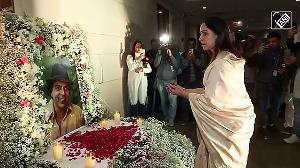 Former Labour Party leader Michael Foot, a friend of India who supported Indian independence movement steadfastly, died in London late Wednesday. He was 96.
Former Labour Party leader Michael Foot, a friend of India who supported Indian independence movement steadfastly, died in London late Wednesday. He was 96.
The Indian Journalists' Association (IJA) expressed its deep sorrow at the passing away of Michael Foot, describing him as "an unwavering friend of India and an unabashed admirer of Jawaharlal Nehru".
"Foot's interest in India and support for the Indian Independence movement was kindled in his youth. He joined the India League, founded by Krishna Menon to campaign for Indian freedom in the United Kingdom," it said in a statement.
A journalist, Foot became a politician by occupation, rising through the ranks of the Labour Party to become deputy prime minister under James Callaghan in the 1970s before being elected its leader.
He was an extraordinary orator, whether in Parliament or public platforms. He belonged to the Left of the Labour movement.
Foot courted controversy when as deputy prime minister he supported the promulgation of an Emergency by prime minister Indira Gandhi in 1975.
But Foot felt he was justified to take this stand when the Indian leader latter lifted this and called elections in 1977, which she lost.
Foot was elected Labour leader in 1980, succeeding Jim Callaghan, but stood down after a heavy defeat in the 1983 election to Margaret Thatcher. A prolific writer, Foot was first elected to Parliament in 1945 and was an MP for 42 years.
Prior to becoming Labour leader, Foot served in the Callaghan and Harold Wilson governments as Minister for Employment and Commons leader.
Foot's death was announced in the House of Commons by Justice Secretary Jack Straw, who paid tribute to his skills as a Parliamentary orator, comparing one speech he had given in 1980 to a "Mozart concerto".
"He was held in very great affection in all sections of the House and the country," Straw said. Foot died shortly before 0700 GMT at his home in Hampstead, north London. He had been ill for some time with fading health and had been receiving 24-hour care.
Foot began his career as a journalist, and was editing the London Evening Standard by the age of 28. He had two spell as editor of left-wing journal Tribune, a magazine he would continue to contribute to into old age.
He entered Parliament in 1945, in Clement Attlee's postwar landslide and became a fierce champion of left-wing causes as well as a founder member of the Campaign for Nuclear Disarmament.
He was thrown out of the Parliamentary Labour Party for two years because he opposed increases in defence spending. He was employment secretary in the 1974-76 Labour government under Harold Wilson and went on to become Leader of the House of Commons between 1976 and the 1979 general election.
IJA President Ashis Ray said Foot always maintained a close relationship with IJA, often phoning its members to enquire about what was going on in India.





